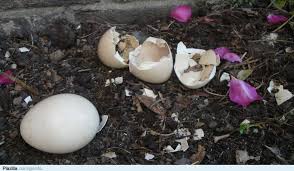 In December and January egg laying will diminish. This is the darkest period of the year. It is for the hen a period to relax a bit and gather energy for the spring.
In December and January egg laying will diminish. This is the darkest period of the year. It is for the hen a period to relax a bit and gather energy for the spring.
Fowl also lay eggs if there is no male around. If you want chicks, of course that 's a man’s job.
Birds and poultry keep mostly in the spring on their nest eggs warm to develop the chickens.
During the breeding season the hen stops laying.
The number of eggs will depend on the amount that the animal can keep warm.
A broody makes typical sounds (cluck-cluck) and rarely leaves the nest. They eat and drink not much, also to prevent they produce a lot of stool and soil the nest.
They keep the eggs at a constant temperature of 41°C and turn them regularly.
The incubation period may vary, also by species and subspecies. Here are some averages.
duck 28
pheasant 24
goose 30
turkey 28
chicken 21
Guinea Fowl 24
partridge 23
swan 35
A dutch saying: all birds lay in May.
Earlier too, and later also. I 've had blackbirds in the climbing roses that during the same spring had three times successive fledged nestlings. If birds in the spring become a couple that is often done by a courtship or mating dance. Mostly the females do not lay more eggs than they can cover and keep warm. Usually, the female incubates, in some species the male helps too. During breeding the female eats and relieves usually only once a day. Some males feed their wife.
A goose (and a swan) is only fertile from her third birthday. She lays an egg every day, sometimes as early as January, but usually from March.
Ducks are sexually mature after about one year.
If the males are courting incessant, chase the females or are aggressive towards anyone approaching, the breeding season comes. In our climate, usually around April-May, but also later in June.
Most ducks find in early spring a partner and mate on the water. Therefore the females get sometimes a bald spot in the neck.
The duck begins to hatch when the clutch is complete, after a week or two.
Our turkey is sexually mature at 30-32 weeks, in the wild after two years.
A gobbler entices a hen by clock sounds and showing off feathers with his tail. A hen lays 8-15 eggs. The chicks climb after 24 hours from the nest and eat themselves. It takes about two weeks before they can flutter a bit. After five weeks the chicks are reasonably independent and around eight weeks they are normally already strong enough to withstand bad weather. Young turkeys remain four to ten months with their mother.
Depending on the breed a chicken is sexually mature after about 6 months.
In 1909 F. H. King saw then already longstanding scale hatcheries in China. The eggs were with hundreds in earthen jars on a braid, and covered with insulating material, kept warm over charcoal. Chicken eggs were checked after 2 days and if not fertilized, yet sold as table eggs.
Ducks and geese eggs were monitored after 6 days. You can see after about 4 days breeding whether or not an egg is fertilized by showing it in front of a strong light source (e.g. the sun, flashlight with cardboard toilet roll). An unfertilized egg remains clear, with a fertilized egg you see a dark spot of the developing blood vessels.
After day 4, they were rotated five times per day. The heat was controlled by sprinkling charcoal and open doors. The temperature was controlled by pressing the tip of an egg on this most sensitive spot: the corner of our eye socket.
Two behavioral ecologists from the University of Vigo in Spain, with their team, exposed eggs from the yellow-legged gull to sounds that pointed to the danger of predators. During the experiment it turned out that not only the embryos communicated about this with the other eggs, but also that they emerged from their eggs much more carefully than the control group. (Nature Ecology & Evolution 2019)
“Tasty animals have never been protected.”(Kade Brown)
“An animal cannot be inanimal, but a man can be inhuman. “(Gertrud Simmel)
